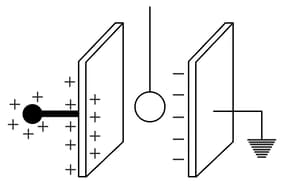Define the following statement: "If there was only one electrically charged particle in the entire universe, the concept of electric charge would be meaningless”.

Important Questions on Coulomb's Law and Electric Field
A polythene piece rubbed with wool is found to have a negative charge of .
(a) Estimate the number of electrons transferred (from which to which)?
(b) Is there a transfer of mass from wool to polythene?
Two identical conducting spheres, one having an initial charge and the other initially uncharged, are brought into contact.
(a) What is the new charge on each sphere?
(b) While the spheres are in contact, a positively charged rod is moved close to one sphere, causing a redistribution of the charges on the two spheres. The closest to the rod has a charge of . What is the charge on the other sphere?

Figure show two charged particles on an axis. The charges are free to move. At one point, however, a third charged particle can be placed such that all three particles are in equilibrium.
(a) Is that point to the left of the first two particles, to their right or between them?
(b) Should the third particle be positively or negatively charged?
(c) Is the equilibrium stable or unstable?

Two small balls having equal positive charge (coulomb) on each are suspended by two insulating strings of equal length (meter) from a hook fixed to a stand. The whole setup is taken in a satellite to space where there is no gravity (state of weightlessness).
(a) What is the angle between the two strings?
(b) What is the tension in each string?
